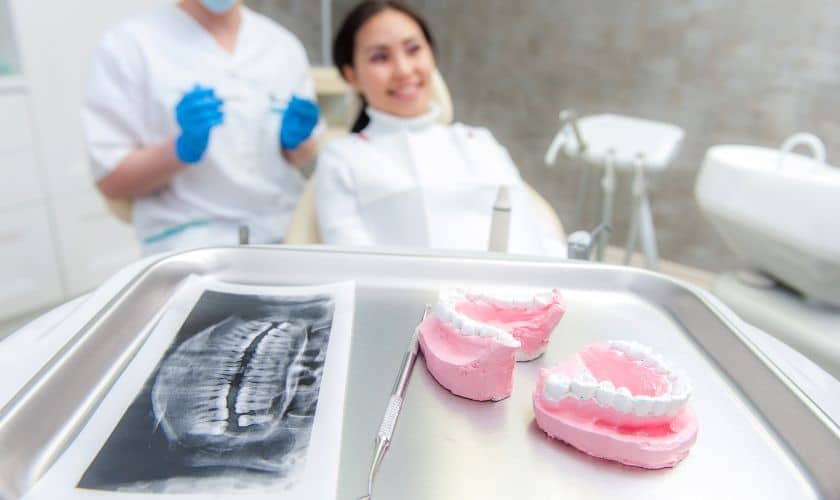
Transform Your Smile with Dental Implants: How They Work and What to Expect
A beautiful smile is undoubtedly one of a person’s most attractive features. However, missing teeth or gaps in your mouth may make you self-conscious and embarrassed to show off those pearly whites. Fortunately, dental implants are an excellent solution for anyone looking to restore their smile’s natural beauty and functionality. In this article, we’ll explore what dental implants are, how they work, their benefits and risks, and what to expect before and after the procedure. So sit back, relax, and get ready to transform your smile with dental implants!
What are dental implants?
Dental implants are artificial tooth roots that provide a permanent base for replacement teeth. They are made of titanium, a biocompatible material readily accepted by the human body. Dental implants have three parts: the implant itself, an abutment, and a crown. The implant is surgically placed into the jawbone to replace the missing tooth root. The abutment is then attached to the top of the implant and serves as a connector between it and the crown – which replaces your natural tooth. Dental implants offer several advantages over tooth replacement options, such as dentures or bridges. Unlike these traditional methods, dental implants mimic natural teeth’ function and appearance. In addition, since they integrate with your jawbone, they also help prevent the bone loss that can occur after you lose teeth. Dental implants have become one of the most popular solutions for people looking to restore their smile permanently – while maintaining good oral health simultaneously!
How do dental implants work?
Dental implants are small titanium posts that act as replacement tooth roots. During the dental implant procedure, these posts are surgically placed into the jawbone and allowed to fuse with the bone over several months. This process is called osseointegration. An abutment is attached to each post once the implants fully integrate with the jawbone. The abutments, such as crowns or bridges, connect the implants and replacement teeth. The final step in the dental implant process involves attaching custom-made replacement teeth to the abutments. These replacement teeth are designed to look and function like natural teeth, allowing patients to eat, speak, and smile confidently. Dental implants provide permanent solutions for missing or damaged teeth without relying on adhesives or other temporary solutions. They also help preserve bone density in the jaw by providing stimulation similar to natural tooth roots. Dental implants effectively allow individuals with missing or damaged teeth to restore their smiles and improve their oral health for years.
The benefits of dental implants
Dental implants can benefit individuals who suffer from missing teeth or gaps in their smiles. One of the most significant advantages is that dental implants look and feel like natural teeth, making them an attractive option for those self-conscious about their appearance. Another benefit of dental implants is that they are a long-lasting solution. Unlike other tooth replacement options, such as dentures and bridges, which may need to be replaced after several years, dental implants can last a lifetime with proper care. Dental implants also provide improved functionality when compared to traditional tooth replacement options. For example, with dental implants, patients can eat and speak more comfortably because the implant posts fuse with the jawbone, creating a sturdy foundation for prosthetic teeth. Moreover, dental implants help maintain oral health by preventing bone loss in the jaw area. When no tooth root is present in the jawbone due to missing teeth or gaps in the smile, it can lead to bone deterioration over time. Dental implants replace these roots and stimulate healthy bone growth around them. The treatment can boost one’s overall quality of life by providing renewed confidence through a beautiful smile and a restored ability to perform everyday activities without discomfort or inconvenience.
Are there any risks associated with dental implants
As with any surgical procedure, there are risks associated with dental implants. However, most patients experience no complications and enjoy a successful outcome. One risk is infection. This can occur if bacteria enter the implant site during or after surgery. To minimize this risk, your dentist will prescribe antibiotics before and after the procedure. Another potential complication is nerve damage. An implant placed too close to a nerve can cause numbness or tingling in the lips, tongue, or chin area. Your dentist will carefully evaluate your anatomy beforehand to avoid this issue. In rare cases, implants may fail to integrate with the jawbone properly, leading to implant failure. Factors that increase this risk include smoking and certain medical conditions such as diabetes. It’s important to discuss all potential risks and complications with your dentist before undergoing treatment so you can decide whether dental implants are right for you.
Source- Teeth Talk Girl
How to prepare for dental implant surgery
Preparing for dental implant surgery is crucial to ensure the procedure’s success. The first step is to find a reputable, experienced dentist specializing in dental implant surgery. Then, schedule an initial consultation with your chosen dentist to discuss your overall health, medical history, and any medications you’re taking. During the consultation, your dentist will also thoroughly examine your teeth and gums to determine if you’re a good candidate for dental implants. They may also take X-rays or use 3D scans for a detailed look at your jawbone structure. Before dental implant surgery, practicing good oral hygiene habits, such as brushing twice daily and flossing regularly, is essential. This helps prevent any potential infections that could delay healing after the procedure. You’ll likely be advised not to eat or drink anything before the surgery, so follow those instructions carefully. Wear comfortable clothing on the day of the surgery and arrange for someone else to drive you home after since anesthesia will be used during the procedure. It’s also essential to prepare mentally by understanding what happens during each stage of implant placement, including postoperative care requirements like diet restrictions and medication management. By following these steps, patients can feel confident entering their dental implant procedures, knowing they’ve done everything possible beforehand for optimal results!
What to expect after dental implant surgery
After dental implant surgery, you may experience some discomfort and swelling around the implant site. This is normal and can be managed with pain medication prescribed by your dentist. It’s essential to follow all post-operative instructions given to you by your dentist to ensure a smooth recovery process. This includes avoiding solid foods for a few days and sticking to soft or liquid diets until the area has fully healed. It would be best to avoid smoking or using tobacco products during this time, as they can interfere with healing. Additionally, it’s essential to keep up with proper oral hygiene practices, such as brushing and flossing regularly. Your dentist may recommend special mouthwash or other cleaning methods specific to dental implants. While there may be some discomfort after surgery, most patients typically find that any discomfort subsides within a week or two following their procedure. So, with proper care and maintenance of your new implants, you’ll soon be able to enjoy a beautiful smile again!
The Bottomline
Dental implants are an excellent solution for those who want to transform their smile and regain confidence. They are a safe and effective treatment option that can last a lifetime with proper care. By understanding how dental implants work and what to expect during the process, you can decide whether they are right for you. Please choose a qualified dentist or oral surgeon with experience placing dental implants to ensure the best possible outcome. Remember that while there may be some discomfort during the healing process, the result will be worth it – a beautiful, healthy smile that you’ll be proud of for years to come!
Recent Posts

How Adhesive Techniques Have Improved Denture Fit

How Dentures Can Renew Mom’s Self-Assurance This Mother’s Day

TMJ Treatment: What to Expect During Your Dental Visit

How Stress Affects Gum Health And Strategies For Stress Management

